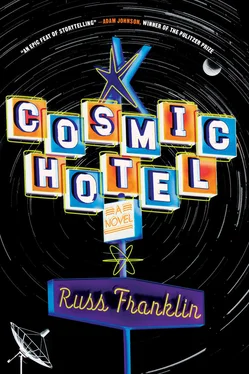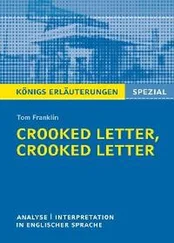From Van Raye’s perspective, he had no idea Ruth Christmas was back on Earth.
Two weeks ago, she’d left the space station via emergency pod, the pod coming to Earth dangling from four parachutes and landing not so gently in Mongolia. There, she traveled via horseback, then bus, then a Roscosmos flight to Star City where she was given a physical, which included peeing on a stick, her condition confirmed, and then she’d hopped a MAC flight to California without telling anyone where she was going.
From Moffett Field, California, she’d taken a cab to the storage lot in Redwood City and liberated Van Raye’s Jaguar, technically her Jaguar because she’d gotten it in the divorce settlement two years ago, though she hated the car, hated driving. She had stopped at the first 7-Eleven and bought a pack of Marlboros and a three-pack of lighters, and then went to Empire Vintage Electronic in Palo Alto. She settled for the solid heaviness of a Trans-Oceanic model 600, bought a new IL6 capacitor, and replaced the old one just to cover her bases. She drove to campus, left the Jaguar in the overflow parking lot, took the Trans-Oceanic, and now she was hiding behind bronze statues of weeping people and watching Van Raye climb the stairs of the auditorium.
She sat on a marble wall to catch her breath, opened the panel on the back of the radio, and checked the tubes, the battery leads. Then she stared at the sculpture garden around her: Rodin’s giant “Gates of Hell,” a twenty-foot bronze, spectacular with the inlaid suffering people, screaming and melting into the surface of the door.
Hell, hell, hell , Ruth thought.
She noted in particular the bronze babies cast along the left column.
The babies made her quit the “Gates of Hell” and take the radio and work up the courage to go inside the auditorium. Why did she want him? He would be a comfort, but she also knew he was the least qualified man in the world to discuss family.

Van Raye looked out at the scant audience in the auditorium, not yet recognizing Ruth sitting in the back. This was depressing, he thought. He used to pack this auditorium, used to pack the lecture room even for a simple Physics 211 lecture.
In the middle seats, he saw the three old string theorists — ruined men who now spent their time attending any lectures. One of them, Gabriel Zepler, was doing something on his phone. Besides them, the audience was older book-club types, no candidates to take home to sleep with tonight. He’d been having an on-again-off-again relationship with a married system administrator from Sunnyvale who had become less and less available, and there was the woman across the aisle on the flight from Seattle to San Francisco yesterday who had recognized him. As soon as she said, “I saw the Report from Earth when I was a teenager. . ” he knew that he would sleep with her that night, and he did.
The auditorium’s giant coffee maker gurgled while a woman from the university bookstore gave an introduction and he went to the podium, thanked her, and read the chapter in The Universe Is a Pair of Pants about the time he drove the Pacific Coast Highway with an “actress.” He referred to her in the essay as “Jessica,” and they stopped at an alfresco Mexican restaurant, were eating at a picnic table above the beach when she said that a friend had told her that you could unlock your car from anywhere in the world by simply broadcasting the signal of your electronic keyless device through your cell phone.
(I kept up with all of Van Raye’s writings. This essay that he read was “There Are Neutrinos in My Hair,” and it first appeared in Playboy , which I had bought several years before, and I will always associate the “actress” with that Playmate of the Month who appeared to enjoy being alone and naked in the desert and eating plums.)
He read about how he told Jessica that even if he weren’t the world’s foremost expert on electromagnetism, if he knew nothing about electronics, he would know that broadcasting her door lock over her cell phone was impossible simply because he could feel how badly she wanted to believe it.
Jessica said, “My friend told me she’s done it. It works.”
“Don’t you feel it?” he said to her.
“Feel what?” she said sitting at the table in her bikini top and a gold hunting horn dangling from a necklace. (He, a French horn player, wrote these details.)
“Don’t you feel this thing inside you,” he said. “This is emotion-driven logic, this feeling of how you want something to be true? How wonderful would the universe be if we could discover this one little thing that tied everything together — phones and door locks? We could unlock our car doors from anywhere ! Wouldn’t that be wonderful? When it feels that kind of wonderful, it’s never true.”
To prove it, he used his charm to borrow a server’s cell phone, and left Jessica at the table and went alone to the gravel parking lot and held the phone to Jessica’s Porsche. Behind the restaurant Jessica held the remote keyless fob to her phone (open line to Van Raye) and tried to broadcast its signal over the airwaves. Nothing happened.
“Nope,” Van Raye said on his end of the phone.
Her voice came from the hollowness of cell phone reception: “Are you holding it to the car?”
“Yes, darling.” He blandly turned the phone to the Porsche and smiled at the waitress who looked out the open window of the taco shack to see what he was doing with her phone. Lifting it back to his ear, he said, “Nothing, dear. Sorry.”
He writes that Jessica was angry: “As if it were my fault that she’d believed this thing.”
He hated the term “skeptic,” but he wrote in “There Are Neutrinos in My Hair” that the more we want to believe in something, the unlikelier it is to be true.
Back eating tacos behind the restaurant, Van Raye took Jessica’s keys off the table and said, “But watch this.” He held it up in the air, pushed the button. He showed her that it was still out of range, her car silent.
“Now,” he said, “put it under your chin like this.” He put the fob beneath his chin in the V of his jawbone and pushed the button. When the wind rested, when the waves were in lull, Van Raye and Jessica could hear a beep coming from her car in the parking lot each time he pushed the button. She wanted to try, pushed it into the tender spot beneath her jaw. Her Porsche beeped and then beeped again.
“Your body is an antennae,” he said to her.
She was underwhelmed, he wrote.
“What’s the difference,” she asked, “in believing this will work, and my idea. . besides the fact one of them was my idea and one was yours?”
“My idea isn’t very grand. It’s not something I felt I wanted to believe in, the way a part of us wants to believe in the supernatural or horoscopes. I could feel how much you wanted to believe that the universe is built like that. Always be suspicious of what you feel yourself wanting to believe. Couldn’t you feel your imagination being played with? I actually felt myself wanting to believe in the idea too.
“Professor Marcello Truzzi said it best: ‘Extraordinary claims require extraordinary proof.’ My idea just uses your whole body as an antenna,” he said. “Of course, some bodies are better than others.”

If you watch the archived video of him reading this essay that night in the auditorium, you’ll be able to distinguish the exact moment when he saw Ruth Christmas.
He noted this person in the audience, a woman in an oversized puffy coat, and he did think she was a homeless person who’d wandered in to eat the free food.
Читать дальше











![Benjamin Franklin - Memoirs of Benjamin Franklin; Written by Himself. [Vol. 2 of 2]](/books/747975/benjamin-franklin-memoirs-of-benjamin-franklin-wr-thumb.webp)
![Benjamin Franklin - Memoirs of Benjamin Franklin; Written by Himself. [Vol. 1 of 2]](/books/748053/benjamin-franklin-memoirs-of-benjamin-franklin-wr-thumb.webp)